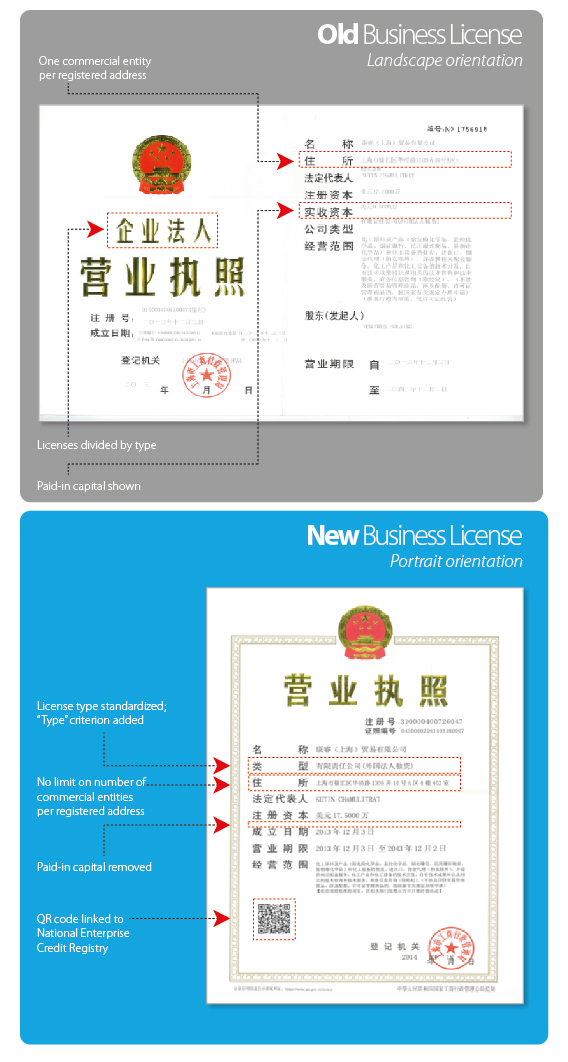License & Registration, Please: New Features of a Business License in China
By Matthew Zito and Rainy Yao
SHANGHAI – If your company has been successfully operating in China for some time, chances are you’ve seen your fair share of business licenses. These, along with a company’s articles of association, are the basic documents of corporate registration in China, held by any legitimate enterprise, foreign-invested or otherwise. A business license is also useful for confirming that one’s partners are who they purport to be, through cross-checking listed information such as the company name, business scope, registered capital, etc. That is, provided the business license itself isn’t a forgery.
Any in-house legal team worth its salt will be attentive to the possibility of fake licenses, but recently you may have noticed some differences in the business licenses coming across your desk. Before discounting them as forgeries, it might be helpful to review changes made to the format of business licenses based on the amended Company Law that went into effect in March of this year.
In the most obvious changes, the redesigned business licenses are in portrait orientation (rather than landscape, as previously) and contain an embedded QR code linked to the company listing in the National Enterprise Credit Registry. Most importantly, however, paid-in capital has been removed from the new licenses—this refers to the percentage of registered capital that a company has actually contributed to its operations in China. The reasoning behind this removal is unclear, as paid-in capital is a useful diagnostic for assessing company performance. This isn’t to say that no one is keeping track of this information anymore—it can still be accessed through local AIC records—but it does make due diligence slightly harder than it used to be.
China Regulatory Brief: Business License Reform & Shanghai FTZ Customs Clearance
Two other minor changes consist of permitting multiple entities to list the same registered address on their respective business licenses, and switching over from a system of multiple types of licenses for different types of commercial entities to a standardized license including a “Type” criterion.
The new licenses will be held by any company founded on or after 1 March 2014, or which has renewed its business license since that time. All companies are required to switch over to a new license before 28 February 2015. In the meantime, however, a dual system is in place where both old and new licenses are in circulation. Making sure you can spot which is which can go a long way toward saving the embarrassment of accusing your partners of using a fake license, and should be a basic element of due diligence in China.

Asia Briefing Ltd. is a subsidiary of Dezan Shira & Associates. Dezan Shira is a specialist foreign direct investment practice, providing corporate establishment, business advisory, tax advisory and compliance, accounting, payroll, due diligence and financial review services to multinationals investing in China, Hong Kong, India, Vietnam, Singapore and the rest of ASEAN. For further information, please email china@dezshira.com or visit www.dezshira.com.
Stay up to date with the latest business and investment trends in Asia by subscribing to our complimentary update service featuring news, commentary and regulatory insight.
Related Reading
 Industry Specific Licenses and Certifications in China
Industry Specific Licenses and Certifications in China
In this issue of China Briefing, we provide an overview of the licensing schemes for industrial products; food production, distribution and catering services; and advertising. We also introduce two important types of certification in China: the CCC and the China Energy Label (CEL). This issue will provide you with an understanding of the requirements for selling your products or services in China.
 Annual Audit and Compliance in China
Annual Audit and Compliance in China
In this issue of China Briefing, we discuss annual compliance requirements for foreign-invested enterprises, including wholly-foreign owned enterprises, joint ventures and foreign-invested commercial enterprises, as well as the less demanding requirements for representative offices. We also highlight the most recent tax and legal changes that will significantly influence the way companies do business in China in 2014.
- Previous Article Raise or Fold: Changing the Registered Capital of a Company in China
- Next Article China Regulatory Brief: New Commercial Registration System & Cross-Border E-Commerce Regulations









